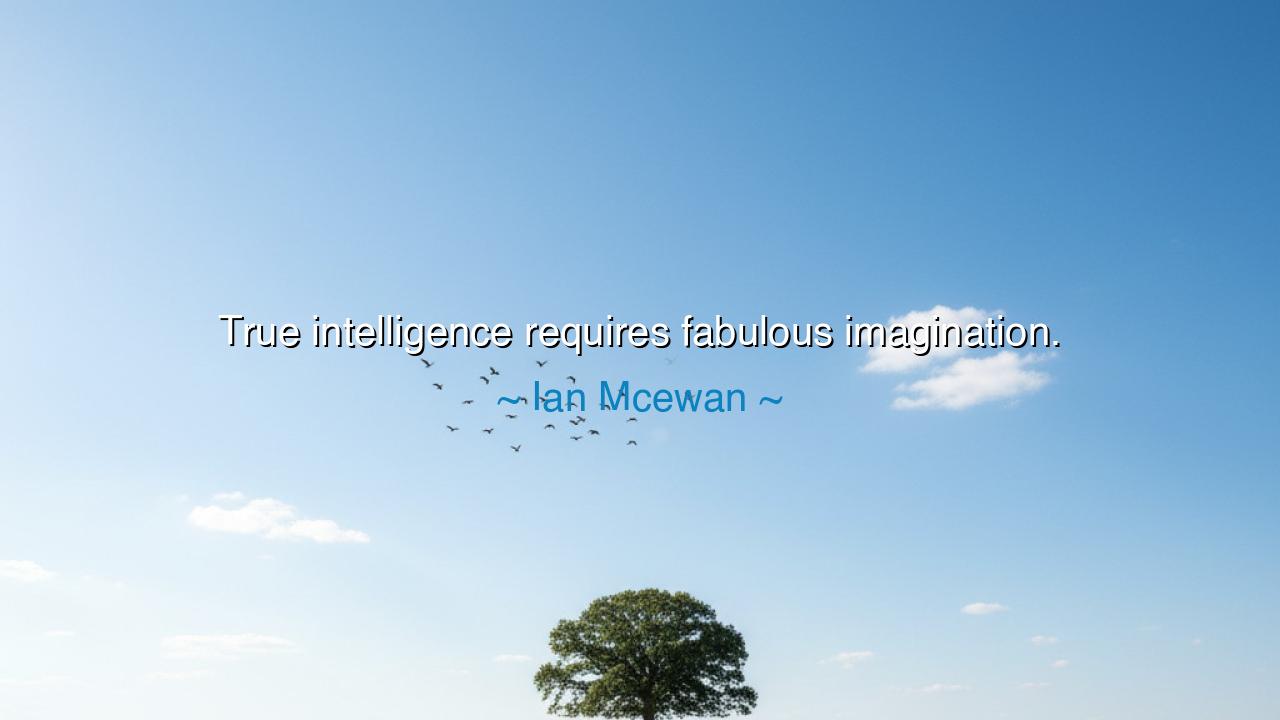
True intelligence requires fabulous imagination.






“True intelligence requires fabulous imagination.” — thus spoke Ian McEwan, the modern craftsman of thought and story, whose words remind us that wisdom without wonder is a barren field. In this brief but radiant sentence, McEwan joins the long chorus of sages who have seen that intelligence is not merely the power to reason, to analyze, or to calculate — but the ability to envision, to dream, to create that which does not yet exist. He teaches that imagination is not the enemy of reason, but its divine companion — that no mind is truly intelligent until it can see beyond the facts into the realms of possibility.
The origin of this quote lies in McEwan’s lifelong exploration of the relationship between logic and emotion, science and art. As a novelist, he has delved deeply into the mechanics of consciousness — how thought, empathy, and creativity weave together to form the fabric of understanding. In speaking of “fabulous imagination,” he draws upon both meanings of the word fabulous: wondrous, and born of fable. He suggests that the greatest minds — whether they build machines or write poems — are those who can blend reason with fantasy, who can dream boldly and yet think clearly. Without imagination, intelligence remains cold and incomplete; without intelligence, imagination drifts without purpose.
This truth has echoed through history since the dawn of human thought. Consider the figure of Leonardo da Vinci, whose mind was both an engine of precision and a wellspring of dreams. He painted the ineffable smile of the Mona Lisa, yet also sketched flying machines centuries before their time. His intelligence was illuminated by imagination — his art informed by mathematics, his inventions inspired by beauty. Leonardo saw no boundary between science and poetry, for he understood that both are born from the same divine impulse: to see beyond what is, and to bring the unseen into being. In him, McEwan’s truth finds its purest form.
But the lesson extends beyond art or science — it touches the heart of what it means to be human. The one who possesses only logic may understand the mechanics of the world, but not its meaning. The one who has imagination, however, can perceive what lies hidden behind appearances — the emotions of others, the beauty in sorrow, the pattern in chaos. True intelligence, then, is not measured by knowledge alone, but by the capacity to empathize, to create, to reimagine reality in service of truth and compassion. It is this union of mind and spirit that elevates the human race beyond survival into civilization.
Even the discoveries that reshape the world begin as acts of imagination. When Albert Einstein pondered the nature of time and light, he did not begin with equations, but with a dream — the dream of riding upon a beam of light through the universe. From that dream was born the theory of relativity, a cornerstone of modern physics. Einstein himself confessed, “Imagination is more important than knowledge. For knowledge is limited, while imagination embraces the entire world.” McEwan’s insight walks in this same tradition, teaching that the wellspring of intellect is not mere information, but the fabulous imagination that gives life and vision to knowledge.
Yet there is also humility in this truth. To possess imagination is not to flee reality, but to deepen it. The intelligent imagination does not build castles in the air for vanity’s sake; it constructs bridges between dream and deed. The scientist must imagine before she proves. The philosopher must imagine before he reasons. The artist must imagine before she creates. The world moves forward because someone dares to see it differently. To imagine, therefore, is to participate in the act of creation itself — to be a co-author in the story of the universe.
And so, the lesson of Ian McEwan’s wisdom is this: if you wish to grow wise, do not sharpen only your reason — nurture your imagination. Feed it with beauty, with curiosity, with compassion. Read not only to know, but to wonder. Look at the world not only as it is, but as it might be. When you solve, imagine; when you learn, dream. For it is in the marriage of intelligence and imagination that humanity finds its greatest achievements — from the symphonies of Beethoven to the discoveries of Newton, from the poetry of Homer to the visions of the stars.
Thus, remember, O seeker of understanding: imagination is not a flight from truth, but its first ascent. Let your mind reason, but let your soul dream. For as McEwan teaches, it is through this divine union — the logic of the mind and the light of the imagination — that one becomes not merely intelligent, but truly wise, and by that wisdom, helps to create a more luminous world.






AAdministratorAdministrator
Welcome, honored guests. Please leave a comment, we will respond soon